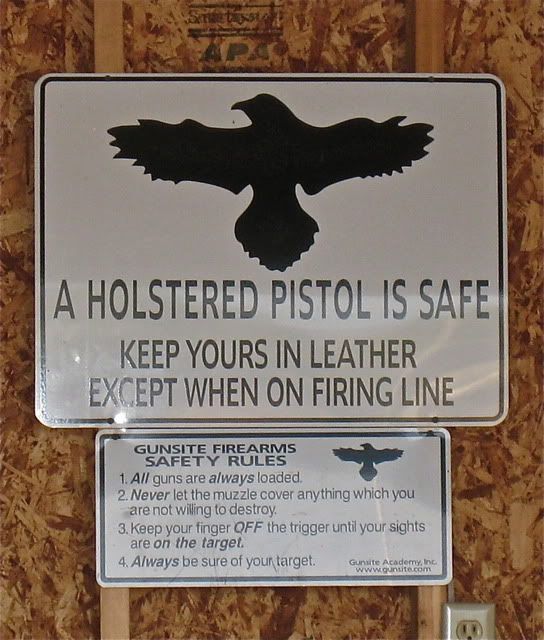Frank Ettin
Administrator
Yes they are. All the time. Every time. Knowing that is where safety starts.Tom Servo said:The gun is loaded in any case. They're all loaded. All of 'em. I've lived by that rule, and things like this don't happen to me.
The Cooper/Gunsite Four Rules:

Remember that the Four Rules describe an appropriate mindset for safe gun handling. Those of us who have trained with the Four Rules, and teach with them, understand them as safe handling rules. We know and teach their proper application and context. So --
- If you hand me a gun, don't bother telling me it's not loaded. Because Rule One applies, I won't believe you and will personally verify/clear the gun.
- If I criticize you for pointing a gun at me, my spouse, my cat, or anyone/anything else I value, don't bother trying to excuse yourself by telling me that it's not loaded.
- If your gun fires when you didn't intend it to, don't bother trying to explain yourself by saying anything like, "I didn't think it was loaded." You should have understood that under Rule One since it is a gun it is loaded, and you should have conducted yourself accordingly.
People complain about Rule One. They say that they know there are unloaded guns. But the The Four Rules are rules of gun handling and intended to avoid injury. So as far as I'm concerned, when I pick up a gun, there is no such thing as an unloaded gun, and I conduct myself accordingly.
So what do you do if you have a gun in your hand and you don't want it to be loaded? Well you clear it, of course. So that's what you would do if, for example, you wanted to dissemble if for cleaning or enclose/lock it in a case for legal transportation if the law requires that the gun be unloaded. But while the gun is in your hand you still follow Rules Two, Three and Four. And if the gun is out of your control, Rule One again applies -- so you conduct yourself accordingly and personally verify/clear it if you don't want it to be loaded. (And of course anyone one who uses a gun for practical applications, such as hunting or self defense, in any case needs to be able to handle a loaded gun properly.)
Let's see what Jeff Cooper had to say.
- Jeff Cooper's Commentaries, Vol. 6 (1998), No. 2, pg. 8.
ALL GUNS ARE ALWAYS LOADED
The only exception to this occurs when one has a weapon in his hands and he has personally unloaded it for checking. As soon as he puts it down, Rule 1 applies again. - Jeff Cooper's Commentaries, vol.9 (2001), No. 6, pg. 29:
...We think that "treat all guns as if they were loaded" implies with the "as if" qualification a dangerous choice of assumptions... - Jeff Cooper's Commentaries, vol.11 (2003), No. 13, pg. 64:
...A major point of issue is Rule 1, "All guns are always loaded." There are people who insist that we cannot use this because it is not precisely true. Some guns are sometimes unloaded. These folks maintain that the rule should read that one should always treat all guns as if they were loaded. The trouble here is the "as if," which leads to the notion that the instrument at hand may actually not be loaded....
Then as As John Schaefer, another student of Col. Cooper, puts it:
All firearms are loaded. - There are no exceptions. Don't pretend that this is true. Know that it is and handle all firearms accordingly. Do not believe it when someone says: "It isn't loaded."
And at that same link, Mr Schaefer quotes John Farnam in part as follows:
...The correct philosophical approach to serious firearms training is the "the condition doesn't matter" method. This was first articulated by Uncle Jeff in his four rules, but all four can all be rolled together in the universal admonition "DON'T DO STUPID THINGS WITH GUNS!" The "hot range" concept logically flows from this philosophical conclusion. Now, we handle all guns correctly, all the time. We don't have to "pretend" they're loaded. They ARE loaded, continuously, and all students need to become accustomed to it....
A short time ago I received the following (quoted in part) in an email from another Gunsite alumnus:
Negligent discharges that result in injury are the result of 1. IGNORANCE, and/or 2. COMPLACENCY and/or 3. HABIT that is inappropriate to changed conditions.
Proper training with the universal rules can only address #1 and #3.
...The great deficiency of much NRA civilian training ... is that muzzle and trigger discipline are not rigorously enforced except when on the range when the line is hot and sometimes not even then. Change the conditions to carrying a loaded gun at all times and adverse results are predictable.
EXAMPLE #1: Trap and skeet shooters often rest muzzles on their toes and point them at each other. They have almost no accidents on the range because guns are unloaded until just before they shoot. ...CHANGE CONDITIONS to a duck blind with loaded guns and the results are predictable....
One thing that Jeff Cooper said ... made a big impression on me. It is seldom repeated. To address complacency he said that every morning when he picks up his gun he says to himself "somewhere today someone is going to have an accident with a gun - not me, not today".
